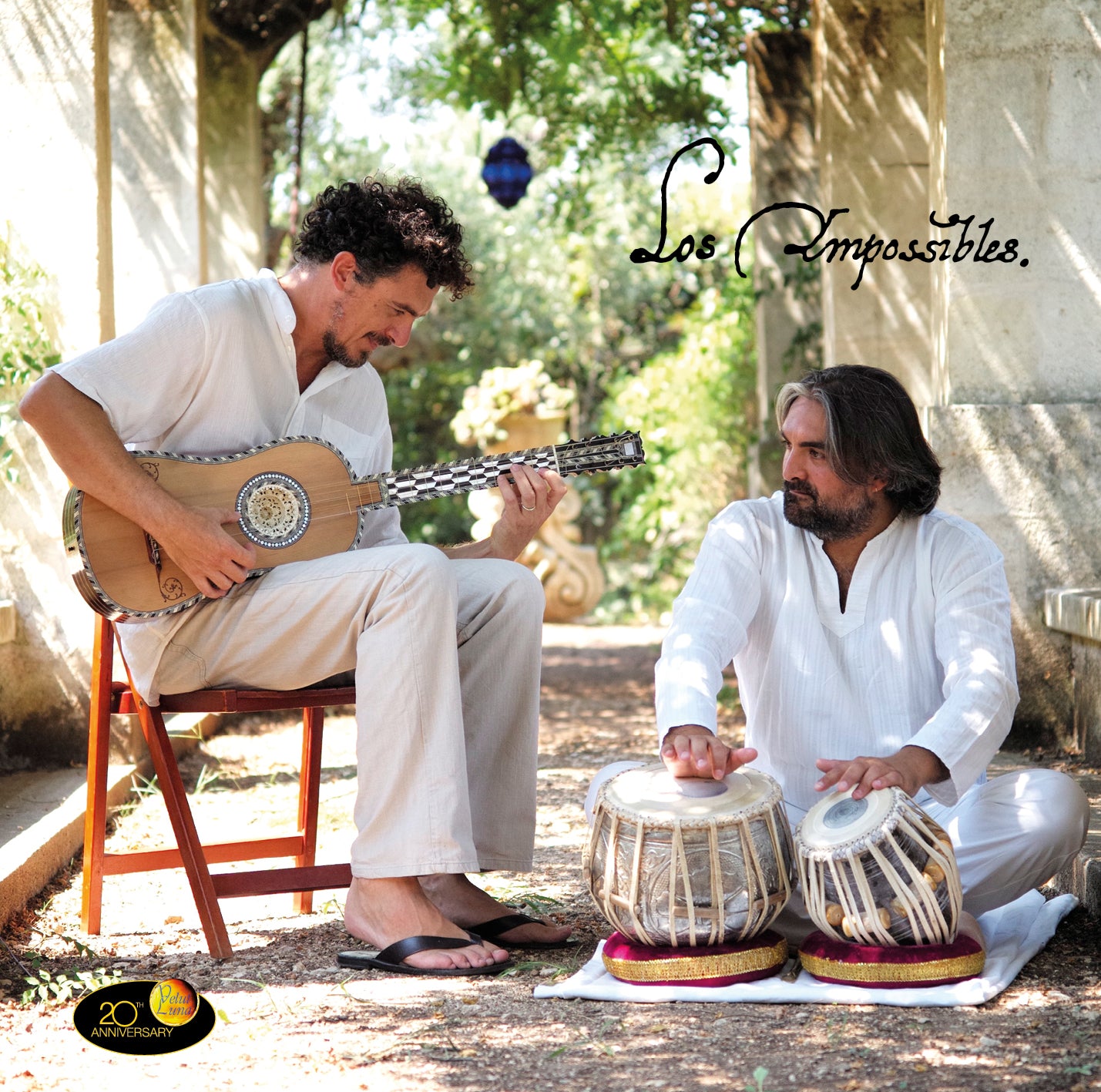Velut Luna
LOS IMPOSSIBLES - Tarantino, De Lorenzi, Bardoscia
LOS IMPOSSIBLES - Tarantino, De Lorenzi, Bardoscia
Genere musicale: Folk, Musica del mondo e Classica
Disponibile
Impossibile caricare la disponibilità di ritiro
LOS IMPOSSIBLES (CVLD273)
Autore: AAVV
Esecutore: Luca Tarantino (baroque guitar), Vito De Lorenzi (tabla and percussions), guest artist: Marco Bardoscia (double bass)
Disponibile in: File HD, CD
Tracce
01 - Jacaras (A. de S. Cruz) 5:44
02 - Gallardas(G. Sanz, A. de S. Cruz, S. de Murcia) 4:54
03 - Canario sobre la C (A. de S. Cruz, G. Montesardo, G.B. Abatessa) 4:18
04 - Fandango, Fandango indiano (S. de Murcia, E-Mn Ms. 811) 7:34
05 - Capona quarta (F. Valdambrini) 3:54
06 - Otros Canarios (S. de Murcia) 6:10
07 - Canarios (S. de Murcia) 3:01
08 - Preludio (G. Sanz) 3:07
09 - Folias Gallegas (S. de Murcia) 7:01
10 - Los Impossibles (S. de Murcia) 5:30
11 - Ciacona (G. P. Foscarini, Alessandro Piccinini) 4:18
12 - La Jota (S. de Murcia, E-Mn Ms. 811) 7:15
24bit/96kHz original recording made at Chora Studi Musicali, Monteroni di Lecce, Italy on July 2015
Production: VELUT LUNA / Executive Producer: Marco Lincetto / Artistic Direction: Luca Tarantino / Recording Supervisor: José Luis Molteni / Balance Recording, Editing and Mix: Valerio Daniele / Mastering: Marco Lincetto at Velut Luna Studio / Photos: Lu Negro / Layout: L’Image / Sales Manager: Patrizia Pagiaro
Note
Questo disco mette in musica un incontro immaginario. Un chitarrista compositore del tardo seicento spagnolo, alla ricerca di danze e can-zoni si imbatte in un suonatore di Tabla, lontano discendente di quelle famiglie nomadi che dall’India, sin dal basso medioevo, migrarono attraverso l’Anatolia in tutta l’Europa, trovando dimora stabile nell’Andalusia spagnola, già terra di convivenza tra ebrei e mori di lingua araba.
Plausibile, ma impossibile. Come impossibile è l’incontro tra la chitarra barocca, massimo interprete della tendenza all’ornamentazione che caratterizza tutta la cultura spagnola già dal rinascimento, e i Tabla, coppia di tamburi simbolo, assieme al Sitar, della fase matura della musica classica indiana.
I linguaggi dei due strumenti hanno un carattere comune: la Glosa (Vistar, in indiano), ossia la variazione sul tema, che introduce nuovi spunti tematici, a loro volta oggetto di glosas. Si dice che in Andalusia quest’inedita mescolanza abbia dato vita al Flamenco.
Abbiamo immaginato che questo repertorio ponesse i due strumenti in grado di dialogare, partendo dalle poche fonti, scritte ed orali, che da lì a breve sarebbero diventate nel mondo, per antono-masia, la musica degli zingari spagnoli.
Era il febbraio del 2011 quando Marco Bardoscia, contrabbassista e compositore salentino, responsabile artistico della rassegna SoundMakers, propose a Luca e Vito di esibirsi insieme in un concerto improvvisato e imprevisto. Il tema della rassegna prevedeva infatti l’organizzazione estemporanea di incontri non concordati tra musicisti quanto mai distanti tra loro per stile, studi, linguaggio.
Luca proviene dal conservatorio e dalla musica antica, Vito dalla world music con una laurea in musica classica indiana.
Da lì a intuire che tabla e liuti possano andare d’accordo è un attimo.
Strumenti delicati e perfetti, costruiti con equilibrio sottile tra misture di materiali eletti dalla tradizione, da maestri che per secoli hanno tramandato, a voce per larga parte, i segreti della lavorazione di ebano, pelle, madreperla, avorio, pece, budello, palissandro, abete, pergamena al fine di accompagnare il canto, la danza, i moti dell’animo, la lode al supremo.
Separati da altri progetti musicali, i componenti del duo hanno atteso sino al 2013 per poter di nuovo suonare insieme, grazie alla nascita di Desuonatori, coordinamento di autoproduzioni per la socializzazione di musica inedita in nuovi contesti di fruizione, da un’idea di Valerio Daniele, chitarrista e produttore, artefice della rivoluzione linguistica che ha investito la musica tradizionale salentina dagli anni 2000. Il duo ha così ripreso a farsi ascoltare, esibendosi in rassegne e house concerts.
Nel 2015, assunto il nome di Los Impossibles (dal titolo di un brano di Santiago de Murcia, sul basso della Vacas, versione spagnola della Romanesca italiana) il repertorio del duo si concentra soprattutto sull’interpretazione del repertorio italiano e spagnolo sei-settecentesco per chitarra barocca. Su questo strumento infatti, già dal primo seicento si documentano i primi tentativi di avvicinamento alla musica popolare di tradizione non scritta da parte di musicisti di estrazione colta (tre secoli prima della nascita dell’etnomusicologia moderna).
La nostra lettura delle fonti parte da Girolamo Melcarne detto Il Montesardo, autore nel 1606 della prima raccolta di intavolature per chitarra, e si spinge sino a Santiago de Murcia, compositore spagnolo che nel primo ‘700 trascrisse per il proprio strumento, oltre a minuetti, arie gravi e allemande, anche le musiche degli indiani, come il Fandango, la Cumbee, Zarambeque, senza peraltro risparmiare Follie e Tarantelle.
Ottima musica per accompagnare attività di studio: non distrae.
Non si capisce perchè il mio nome o il mio sopranno me debba essere sostituito da John Smith.
Share

-

Spedizioni prodotti fisici
Spedizioni gratuite in Europa (UE), a partire da 4 articoli - Richiedere quatozione per i costi di spedizione per i paesi non UE
-

Consegna prodotti digitali
La consegna dei prodotti digitali avverrà direttamente sul sito e riceverai anche una email con il link per il download dei file.
-

Scrivi una recensione
Qui sopra puoi scrivere una recensione sul prodotto che hai acquistato, saremo felici di conoscere la tua opinione.


